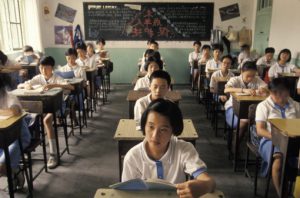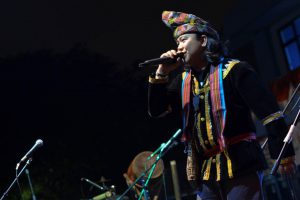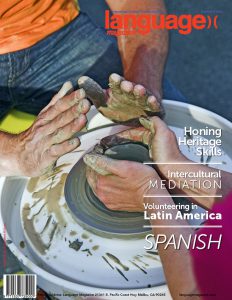 China will introduce a National English Proficiency Test by 2020 as implemented by China’s State Council. The council set out the national foreign language proficiency testing goals in 2014, where they stated that China needs to build a “standardized, consistent, functional, and modern system” by 2020.
China will introduce a National English Proficiency Test by 2020 as implemented by China’s State Council. The council set out the national foreign language proficiency testing goals in 2014, where they stated that China needs to build a “standardized, consistent, functional, and modern system” by 2020.
English Proficiency Test Coming to China
English and Portuguese Brains ‘Read’ Alike
 An international research team led by Carnegie Mellon University has found that when the brain “reads” or decodes a sentence in English or Portuguese, its neural activation patterns are the same.
An international research team led by Carnegie Mellon University has found that when the brain “reads” or decodes a sentence in English or Portuguese, its neural activation patterns are the same.
Published in NeuroImage, the study is the first to show that different languages have similar neural signatures for describing events and scenes. The research team discovered this by using a machine learning algorithm that essentially learns the relationship between sentence meaning and brain activation patterns in English and then recognizes sentence meaning based on activation patterns in Portuguese. The findings can be used to improve machine translation, brain decoding across languages, and potentially second-language instruction.
Canadian Conservatives Hold Bilingual Debate
 The 14 official candidates of the Canadian Conservative party will have their dual-language skills tested live tonight (December 6) at the first official bilingual debate in the election. The format will be similar to other leadership debates, however the questions will alternate between French and English. The debate will cover the two compound themes of “Employment, Infrastructure, and Labor” and “Family, Children, and Health.” The debate is set to have eight questions, four of which will focus on the policy themes and four which will come Conservative party members and supporters. The candidates will have 50 seconds to respond and one opportunity to deliver a 30-second rebuttal.
The 14 official candidates of the Canadian Conservative party will have their dual-language skills tested live tonight (December 6) at the first official bilingual debate in the election. The format will be similar to other leadership debates, however the questions will alternate between French and English. The debate will cover the two compound themes of “Employment, Infrastructure, and Labor” and “Family, Children, and Health.” The debate is set to have eight questions, four of which will focus on the policy themes and four which will come Conservative party members and supporters. The candidates will have 50 seconds to respond and one opportunity to deliver a 30-second rebuttal.
Strategists suggest that viewers will be analyzing candidates’ varying level of French-speaking proficiency. Candidates are aiming to gain a share of the points allotted to the 78 electoral district associations in Quebec. Conservatives saw grown in Quebec over the last federal election, and the prospective points could help inch a Conservative candidate towards the prime minister seat.
According to MSN, of the 14 candidates Chris Alexander, Maxime Bernier, Steven Blaney, Michael Chong, Rick Peterson and Andrew Scheer are considered to be bilingual, while Kellie Leitch, Deepak Obhrai, Lisa Raitt and Brad Trost have trouble with French. Pierre Lemieux, Dan Lindsay, Erin O’Toole and Andrew Saxton, “can speak the language a little, with varying degrees of ease or difficulty.”
Many viewers will likely compare the candidates ability to engage in quick witted debates in both French and English to current Prime Minister Justin Trudeau, who grew up speaking both languages and is fluent in both languages.
The debate is available to stream at http://www.cpac.ca/en/. It is the second of five party sanctioned debates. The Leadership Election Organizing Committee also announced that the next debate will be in French on January 17 in Quebec City, Quebec. Dan Nowland, chair of the Leadership Election Organizing Committee, is looking ahead to the debate in Quebec and said, “Quebec City is a great fit for our French language debate. Our members there have shown enthusiasm to hold this third debate in our series, and the Leadership Election Organizing Committee is pleased to be able to have Quebec City play host to our first debate of the New Year. Choosing the next Conservative leader will be an important part of Canada’s future, and we’re pleased to provide Conservatives, and all Canadians, the opportunity to inform their choice with these debates.”
All debates are open for Conservative Party members to attend the debates; those interested in attending are encouraged to call membership services at 1-866-808-8407 or visit conservative.ca
Labor Unrest in Cameroon Erupts from Language Discrimination
 Violence between Cameroon’s French and English speakers has boiled over due to discrimination by French speakers in minority English-speaking regions. Volatile clashes with police has claimed at least four lives.
Violence between Cameroon’s French and English speakers has boiled over due to discrimination by French speakers in minority English-speaking regions. Volatile clashes with police has claimed at least four lives.
Cameroonian police have arrested over 100 protesters in the northwest city of Bamenda, where protests erupted over the use of French as the official language and the dismissal of English. Both English and French are the official languages of Cameroon. Lawyers protested, stating the judicial workers have little knowledge of the jurisdiction of British law which operates in the city, while teachers protested to fight the use of French on the English area schools.
According to Deutsche Welle, English-speakers have been protesting against what they see as “second-class citizen status” in the west African nation. While over 80 percent of those in Cameroon understand French, two regions—northwest and southwest—are English-speaking. John Fru Ndi, leader of the Social Democratic Front (SDF) told DW that the government should heed the warning being presented by teachers, lawyers, and the general English-speaking population, and said, “We can summon a big rally here where we will talk to the people. But this should be after solutions to the teething problems that people are asking for have come in from Yaounde.”
While all government documents in Cameroon are to be printed in both French and English, there is concern of some government documents being printed in only French, along with public figures giving speeches in French in English-speaking regions. These protest come only years about February in 2008 when a transport union strike in Douala escalated into violent protests in 31 municipal areas, giving Cameroon its worst violence in 15 years. Many fear that the deaths are only the beginning of this dissatisfaction over language unity in Cameroon.
Malaysian DJ Spins Sabeh
 Atama Katama, a Malaysian DJ who has been spinning dance music across Malaysia for the past 15 years, has recently turned his attention towards indigenous issues and language. Katama, who has been playing dance music through the 1990’s at hip hop clubs, told Reuters that his curiosity was piqued when a fellow DJ asked about his indigenous roots in Sabeh. Katama is the son of Ambrose Mudi, a Sabeh singer-songwriter, says he took inspiration from the instruments that his father would play, and that he grew up around.
Atama Katama, a Malaysian DJ who has been spinning dance music across Malaysia for the past 15 years, has recently turned his attention towards indigenous issues and language. Katama, who has been playing dance music through the 1990’s at hip hop clubs, told Reuters that his curiosity was piqued when a fellow DJ asked about his indigenous roots in Sabeh. Katama is the son of Ambrose Mudi, a Sabeh singer-songwriter, says he took inspiration from the instruments that his father would play, and that he grew up around.
Arrival Decodes Linguistic Profession

The recent blockbuster Arrival has linguists in the forefront. Amy Adams plays the protagonist, Louise Banks, an academic field researcher who is recruited by the U.S. military to help communicate with an alien race that has descended on earth with unknown intentions. Much different than the usual extraterrestrial story line a la Mars Attacks, Arrival focuses on the value of communication, the power of translation, and how linguists do field work to understand new languages.
Miao Discovered In Cave Carvings
 After six years of research, archeologists have confirmed that inscriptions found among cliffs in the Hunan Province are of the Miao language. Miao is a language of the ethnic minority in China that today is spoken only, whose written language is only known through folklore and Miao folk songs. According to Shanghai Daily, Archeologists claimed the characters were carved during the Ming (1368-1644) and Qing (1644-1911) dynasties. The Miao is actually a non-homogenous group of people that the Chinese government has grouped together, recognized by the government of China as one of the 55 official minority groups. Although they are a linguistically-related ethnic minority in Southwest China, their makeup is diverse. Their history is also deep in china, as according to André-Georges Haudricourt and David Strecker, the Miao were among the first people to settle in present-day China.
After six years of research, archeologists have confirmed that inscriptions found among cliffs in the Hunan Province are of the Miao language. Miao is a language of the ethnic minority in China that today is spoken only, whose written language is only known through folklore and Miao folk songs. According to Shanghai Daily, Archeologists claimed the characters were carved during the Ming (1368-1644) and Qing (1644-1911) dynasties. The Miao is actually a non-homogenous group of people that the Chinese government has grouped together, recognized by the government of China as one of the 55 official minority groups. Although they are a linguistically-related ethnic minority in Southwest China, their makeup is diverse. Their history is also deep in china, as according to André-Georges Haudricourt and David Strecker, the Miao were among the first people to settle in present-day China.
Archeologists have been conducting research on over two-hundred cliff carving sites along river valleys in Chenbu Miao Ethnic County since 2010. They have concluded that the characters and symbols may be records of the life, agriculture, and religious beliefs of the early Miao people.
A Star Talks
 Laura Murray explains to Mary Thrond and Daniel Ward how her fascination with Chinese culture and history led to a lifetime of achievement and adventure, including the creation of the STARTALK program, which has acted as a catalyst for advanced language acquisition in the U.S. Since 2006, STARTALK has provided learning opportunities in critical languages for students (K–16) and professional development for teachers of critical languages, primarily through summer programs. Currently, programs are being implemented in Arabic, Chinese, Dari, Hindi, Korean, Persian, Portuguese, Russian, Swahili, Turkish, and Urdu.
Laura Murray explains to Mary Thrond and Daniel Ward how her fascination with Chinese culture and history led to a lifetime of achievement and adventure, including the creation of the STARTALK program, which has acted as a catalyst for advanced language acquisition in the U.S. Since 2006, STARTALK has provided learning opportunities in critical languages for students (K–16) and professional development for teachers of critical languages, primarily through summer programs. Currently, programs are being implemented in Arabic, Chinese, Dari, Hindi, Korean, Persian, Portuguese, Russian, Swahili, Turkish, and Urdu.
Oxford Dictionaries’ Word of the Year 2016 is POST-TRUTH
post-truth adjective
Relating to or denoting circumstances in which objective facts are less influential in shaping public opinion than appeals to emotion and personal belief.
Oxford Dictionaries has announced post-truth as its 2016 international Word of the Year. The Oxford Dictionaries Word of the Year is a word or expression chosen to reflect the passing year in language. Every year, the Oxford Dictionaries team reviews candidates for word of the year and then debates their merits, choosing one that captures the ethos, mood, or preoccupations of that particular year. Language research conducted by Oxford Dictionaries editors reveals that use of the word post-truth has increased by approximately 2,000% over its usage in 2015.
The concept of post-truth has been in existence for the past decade, but Oxford Dictionaries has seen a spike in frequency this year in the context of the EU referendum in the UK and the presidential election in the U.S. It has also become associated with a particular noun, in the phrase ‘post-truth politics’.
November 2016
 Honing Heritage Learners: Maria M. Carreira offers a framework and supporting strategies for
Honing Heritage Learners: Maria M. Carreira offers a framework and supporting strategies for
teaching mixed classes
Strengthening Oral Proficiency with RICH: Ligia Martinez offers a strategy for Heritage Speakers
Breaking the Comprehension Barrier: Felicia Rateliff and Brian Pitts report on the technology a Texas school district is using to solve ELL reading barrier issues
Viva España: Daniel Ward argues that economically there’s never been a better time to study in Spain
Intercultural Mediation: Ian Akhbar stresses the importance of appropriate cultural education
First Aid: Volunteering for mutual benefit


